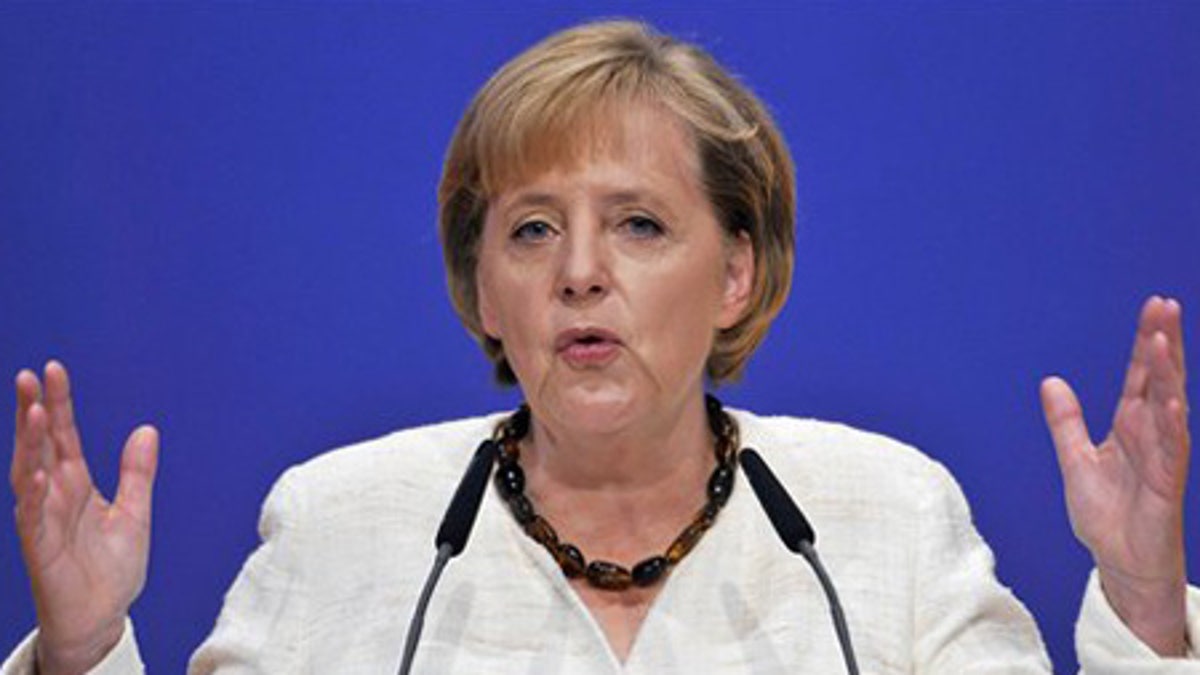
Sept. 26: German Chancellor Angela Merkel speaks during the final rally of the Christian Democratic Party, CDU, before the German elections in Berlin. (AP)
BERLIN – Germans were deciding Sunday whether to return the nation's first woman chancellor to a second term in office following a lackluster election campaign centered largely on economic issues and a rash of last-minute threats by Islamic extremists.
Chancellor Angela Merkel is hoping enough of the nation's 62.2 million eligible voters will support her conservative Christian Democratic Party to give them a solid enough standing to form a center-right coalition with their top partners, the Free Democrats.
One of the final surveys before voting began at 8 a.m. (0600GMT; 2 a.m. EDT) Sunday indicated the conservatives could capture 33 percent of the vote, while the Free Democrats were supported by 14 percent in the poll by the Forsa institute.
That would give them a razor-thin majority in parliament and allow Merkel to break with her partners of the past four years, the left-center Social Democrats — Germany's other traditional main party. In the Forsa survey they received only 25 percent support from the 2,001 people questioned. The poll gave a margin of error of plus or minus 2.5 percentage points.
Among the other parties currently represented in parliament, the Greens polled at 10 percent, just behind the Left party at 12 percent.
Despite its predicted status as the third-strongest party, both the Christian and Social Democrats have ruled out a coalition with the Left, which burst onto the political spectrum in 2005 after ex-Communists banded together with defectors from the Social Democrats, disenchanted by their party's swing to the center.
The Social Democrats, in power since 1998, are facing historical lows. Many analysts have argued they could benefit from a period in opposition that would let them regroup.
Security is tight across Germany, following a rash of threats by Islamic extremists apparently seeking to sway voters by threatening retaliation if Germany does not pull its 4,200 troops out of the NATO mission in Afghanistan.
Both Merkel and her main challenger, Frank-Walter Steinmeier of the Social Democrats, ignored the threats in their parties' final rallies Saturday and instead focused on the key domestic issues of jobs and economic recovery.
Two videos surfaced Friday — one by Al Qaeda and another by the Taliban — threatening retaliation for Germany's military presence in Afghanistan. The Taliban video showed top German landmarks like the Brandenburg Gate in Berlin and Munich's world-renowned Oktoberfest beer festival.
President Horst Koehler urged Germans go to the polls, recalling that the right to vote was not something to take for granted.
"People have died for the free, secret and equal right to vote. It's our democracy and we should not weaken it," Koehler said in a statement published in the Bild am Sonntag weekly.
